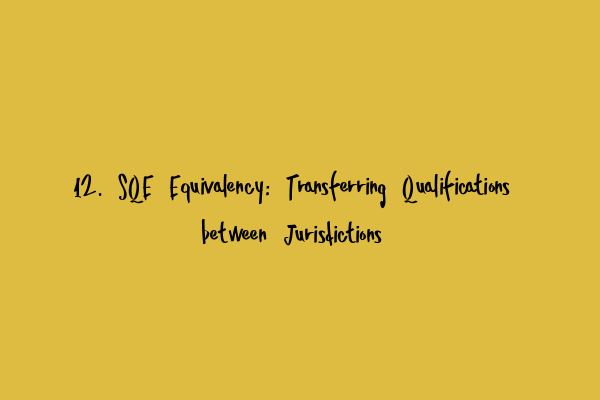SQE Equivalency: Transferring Qualifications between Jurisdictions
When it comes to pursuing a legal career, aspiring solicitors often face the challenge of transferring qualifications across different jurisdictions. This may be due to a change in personal circumstances or seeking professional opportunities in another country. The introduction of the Solicitors Qualifying Examination (SQE) in England and Wales aims to simplify this process and provide an equivalency framework for transferring qualifications. In this article, we will explore the SQE equivalency and how it facilitates the transfer of qualifications between jurisdictions.
Understanding the SQE
The SQE is a new assessment framework introduced by the Solicitors Regulation Authority (SRA) in England and Wales. It is designed to replace the previous qualification pathway, which consisted of the Legal Practice Course (LPC) and the Professional Skills Course (PSC). The SQE aims to create a more flexible and accessible route to becoming a solicitor.
The SQE consists of two stages: SQE1 and SQE2. SQE1 focuses on testing candidates’ legal knowledge and understanding through multiple-choice questions (MCQs) and computer-based assessments. SQE2, on the other hand, assesses candidates’ practical legal skills by engaging them in simulated client interviews, advocacy, and legal research tasks.
Throughout the SQE journey, candidates are required to demonstrate competency in both academic knowledge and practical legal skills. This ensures that those who qualify through the SQE equivalency have the necessary skills and capabilities to practice as solicitors.
The SQE Equivalency Framework
The SQE equivalency framework provides a streamlined process for transferring qualifications between jurisdictions. It recognizes that legal education and training systems may vary across different countries and aims to provide a fair and efficient assessment process.
Under the SQE equivalency framework, candidates with qualifications from other jurisdictions can apply to have their qualifications assessed. The SRA will evaluate the content and rigour of these qualifications to determine their equivalence to the SQE.
It is important to note that the SQE equivalency does not guarantee an automatic transfer of qualifications or exemption from the SQE assessments. The SRA will assess each case individually based on their criteria and guidelines.
Benefits of the SQE Equivalency
The SQE equivalency offers several benefits to candidates seeking to transfer qualifications between jurisdictions:
- Simplified Process: The SQE provides a clear and consolidated assessment framework, making it easier for candidates to understand the requirements for qualification equivalence.
- Fair Evaluation: The SRA’s assessment of qualifications from other jurisdictions ensures a fair evaluation of candidates’ skills and knowledge, taking into account the differences in legal education and training systems.
- Flexible Pathway: The SQE allows candidates to customize their qualification pathway based on their existing qualifications and experience. This flexibility enables candidates to build on their prior knowledge and focus on acquiring new skills and competencies required for qualification.
- International Mobility: The SQE equivalency opens doors for solicitors to practice internationally by providing a recognized and transferable qualification. It enables solicitors to explore professional opportunities in different jurisdictions without having to start from scratch.
Overall, the SQE equivalency simplifies the process of transferring qualifications between jurisdictions, offering a fair and efficient assessment framework that recognizes the diversity of legal education and training systems globally.
Preparing for the SQE Equivalency
If you are considering applying for the SQE equivalency, it is important to prepare effectively to give yourself the best chance of success. Here are some tips:
- Conquer the Multiple Choice Questions (MCQ) in SQE1: Familiarize yourself with the format and content of MCQs in SQE1. Practice solving MCQs to improve your speed and accuracy.
- Interactive mock tests for SQE: Enhancing engagement and learning: Take advantage of interactive mock tests to assess your readiness for the SQE. These mock tests simulate the actual exam environment and provide valuable feedback on your performance.
- SQE Sample Papers: Practice for Exam Success: Utilize sample papers to practice applying your legal knowledge and skills to real-world scenarios. These papers will help you familiarize yourself with the types of questions and tasks you may encounter in the SQE assessments.
- Focus Areas in SQE1 and SQE2: Mastering Key Concepts: Identify the key concepts and subjects that are frequently tested in SQE1 and SQE2. Devote extra time to mastering these areas to enhance your overall performance.
- Adjusting Your SQE Strategy Based on Mock Performance: Regularly review and analyze your performance in mock tests. Identify areas of improvement and adjust your study strategy accordingly to optimize your preparation.
By utilizing these resources and strategies, you can enhance your preparation for the SQE equivalency and increase your chances of qualification transfer success.
Conclusion
The introduction of the SQE equivalency framework offers a streamlined and fair process for transferring qualifications between jurisdictions. It recognizes the diversity of legal education and training systems globally, providing candidates with an opportunity to showcase their skills and knowledge in a standardized yet flexible assessment framework. By effectively preparing for the SQE equivalency and leveraging the support of specific resources, aspiring solicitors can navigate the transfer process successfully and pursue their legal career goals.
